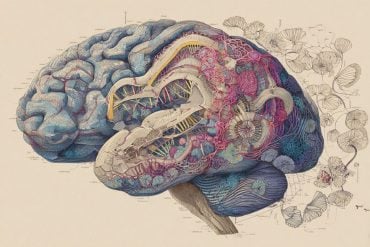Summary: According to researchers, analyzing the gut microbiome of premature babies may help develop personalized feeding patterns and nutrients to help them get stronger.
Source: University of Rochester Medical Center.
About half of babies born prematurely struggle to grow, putting them at risk of health problems that can last a lifetime. Despite years of research, physicians lack a method that consistently helps these infants thrive. A study suggests that the gut microbiome – the trillions of tiny bacteria that live in the digestive tract – could help doctors personalize nutrients and feeding patterns to help the most vulnerable babies get a stronger start to life.
Peering into Poop
From the moment we’re born, the bacteria that live in and on us influence the development and function of every major system in the body. These microorganisms are essential for our health, and poopy diapers contain a treasure trove of information about the ones that live in a baby’s gut.
A team of pediatricians and microbiologists at the University of Rochester Medical Center collected stool samples from 95 preterm infants, born at an average of 29 weeks. Samples were taken weekly while the infants were treated in the neonatal intensive care unit, which ranged from a few weeks to six months.
The researchers analyzed shifts in the gut microbiome over time and the type and amount of nutrients each baby received. They found that the gut bacteria go through changes as a baby matures and identified distinct phases where particular categories of good bacteria dominate.
They also discovered that when the good bacteria thrived, the infants matured more quickly. Infants whose bacterial colonies remained stagnant saw slower rates of growth.
The First Dirty Diaper
Most parents probably remember the greenish-black tarry stuff called meconium that initially appeared in their baby’s diaper. In more than 80 percent of the infants studied, the transition from meconium to normal stool marked a major change in the gut bacteria. Initially, a good bacterium called Bacilli dominated; but, when the babies started producing normal stool, another beneficial bacterium called Gammaproteobacteria took over.
Why does this matter? Like all living things, bacteria need nutrients to survive, so they feed on what we put into our bodies. But, all bacteria are different – some need lots of fats to grow, while others require more protein.
“The nutrients a baby consumes are used by their entire system, including the bacteria that live in that system, so it’s important to understand what bacteria are present and the kinds of nutrients that help them flourish,” said senior study author Steven R. Gill, Ph.D., associate professor of Microbiology and Immunology and co-director of the Genomics Research Center at URMC.
Is the Microbiome the Missing Link?
According to study author Kristin M. Scheible, M.D., a neonatologist at UR Medicine’s Golisano Children’s Hospital (GCH), there are established guidelines for feeding premature infants that are the same for each baby and generally encourage doctors to push calories.
“We have a sense of what types of calories to give, like fats, proteins, and carbohydrates, and an idea of how we should balance these calories. But, even when we push babies above the recommended level of caloric intake many of them still don’t grow,” noted Scheible.
Though their research is still early, Scheible and Gill think the microbiome could be the missing link. Now that they know which bacteria are present, the next stage in their research is to understand how the bacteria use the nutrition that the baby receives.

“The hope is that by adjusting the calories to both the baby and their microbiome we can nourish the system in a way that optimizes growth and allows for development of all the organ systems that are premature,” added Scheible. “Ultimately, we want to feed the right organisms to help feed and grow the baby.”
Personalized Medicine for Preemies
Conducting weekly assessments of each baby’s gut microbiome isn’t currently feasible in NICUs across the country, but the transition from meconium to normal stool is an easy-to-identify marker that physicians could use at the bedside to help guide their decisions on feeding.
Gill sees a future where a personalized microbiome analysis is done for every baby in the NICU.
“Because each baby has a unique microbiome, you can’t feed them exactly the same way or give them all the same probiotics because their bacteria are different,” he said. “By using personalized genomics you can tailor their nutrition and their medications to ensure that the microbiome develops in a healthy way.”
Funding: The research was supported by the National Institutes of Health.
Source: University of Rochester Medical Center
Publisher: Organized by NeuroscienceNews.com.
Image Source: NeuroscienceNews.com image is in the public domain.
Original Research: Open access research for “Impact of prematurity and nutrition on the developing gut microbiome and preterm infant growth” by Alex Grier, Xing Qiu, Sanjukta Bandyopadhyay, Jeanne Holden-Wiltse, Haeja A. Kessler, Ann L. Gill, Brooke Hamilton, Heidie Huyck, Sara Misra, Thomas J. Mariani, Rita M. Ryan, Lori Scholer, Kristin M. Scheible, Yi-Horng Lee, Mary T. Caserta, Gloria S. Pryhuber and Steven R. Gill in Microbiome. Published October 2018.
doi:10.1186/s40168-017-0377-0
[cbtabs][cbtab title=”MLA”]University of Rochester Medical Center”Using the Microbiome to Help Premature Babies Grow.” NeuroscienceNews. NeuroscienceNews, 29 October 2018.
<https://neurosciencenews.com/microbiome-premature-babies-10105/>.[/cbtab][cbtab title=”APA”]University of Rochester Medical Center(2018, October 29). Using the Microbiome to Help Premature Babies Grow. NeuroscienceNews. Retrieved October 29, 2018 from https://neurosciencenews.com/microbiome-premature-babies-10105/[/cbtab][cbtab title=”Chicago”]University of Rochester Medical Center”Using the Microbiome to Help Premature Babies Grow.” https://neurosciencenews.com/microbiome-premature-babies-10105/ (accessed October 29, 2018).[/cbtab][/cbtabs]
Abstract
Impact of prematurity and nutrition on the developing gut microbiome and preterm infant growth
Background
Identification of factors that influence the neonatal gut microbiome is urgently needed to guide clinical practices that support growth of healthy preterm infants. Here, we examined the influence of nutrition and common practices on the gut microbiota and growth in a cohort of preterm infants.
Results
With weekly gut microbiota samples spanning postmenstrual age (PMA) 24 to 46 weeks, we developed two models to test associations between the microbiota, nutrition and growth: a categorical model with three successive microbiota phases (P1, P2, and P3) and a model with two periods (early and late PMA) defined by microbiota composition and PMA, respectively. The more significant associations with phase led us to use a phase-based framework for the majority of our analyses. Phase transitions were characterized by rapid shifts in the microbiota, with transition out of P1 occurring nearly simultaneously with the change from meconium to normal stool. The rate of phase progression was positively associated with gestational age at birth, and delayed transition to a P3 microbiota was associated with growth failure. We found distinct bacterial metabolic functions in P1–3 and significant associations between nutrition, microbiota phase, and infant growth.
Conclusion
The phase-dependent impact of nutrition on infant growth along with phase-specific metabolic functions suggests a pioneering potential for improving growth outcomes by tailoring nutrient intake to microbiota phase.






